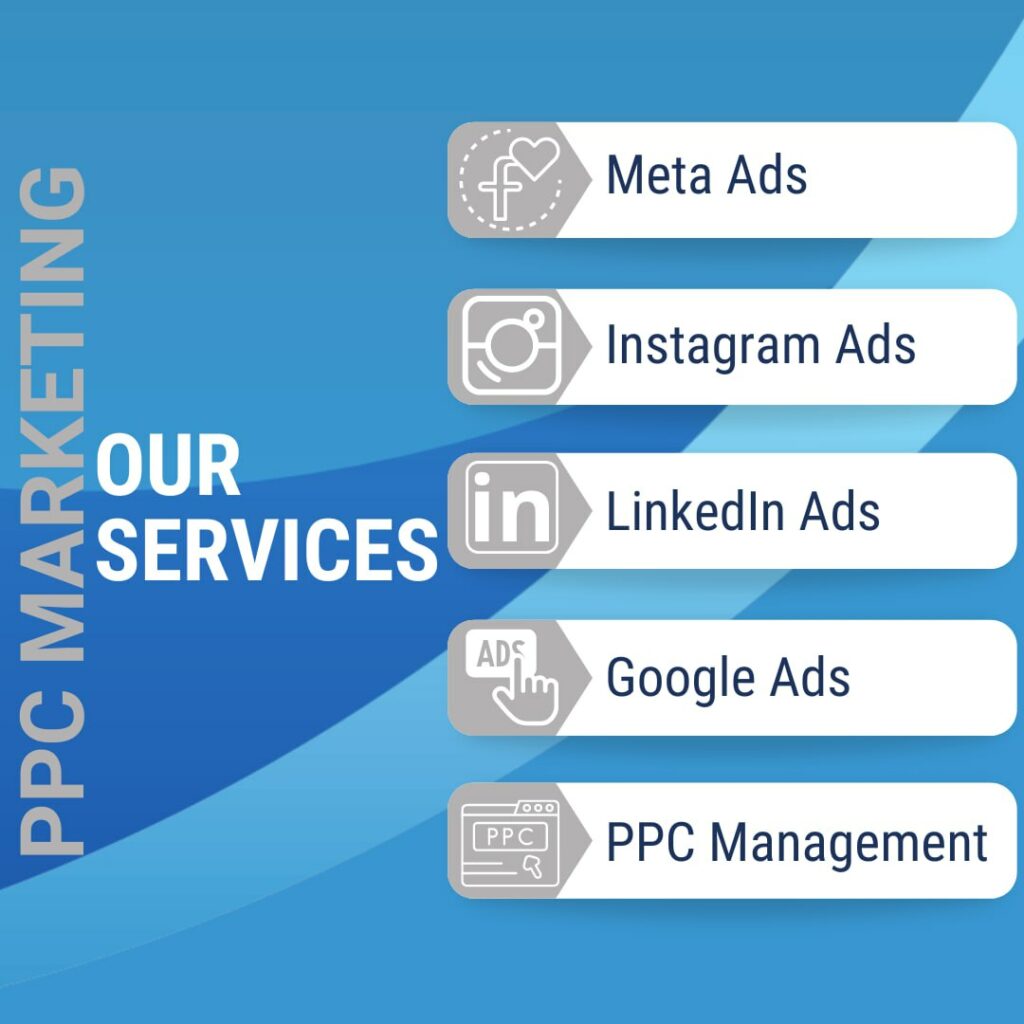Attract your ideal customers. Targeted Google Ads campaigns that convert


Frustrated by missing out on ideal customers searching for your business?
Google Ads can put you front-and-centre, but managing it effectively takes time and expertise.
That’s where the Google Ads management providers shine!
We’re your Google Ads gurus, crafting targeted campaigns with high-impact ad copy.
We’ll research the perfect keywords to ensure your ads appear when people search for what you offer.
Plus, we’ll constantly monitor and optimise for maximum return on investment (ROI).
Let us turn Google Ads into your lead generation powerhouse!
Our expert team specialises in managing ads across leading platforms like Google Ads, Meta Ads (formerly Facebook Ads), Instagram Ads, and LinkedIn Ads.
We’ll tailor campaigns to your specific goals, whether it’s boosting website traffic, generating leads, or increasing brand awareness.
We handle everything from in-depth keyword research and audience targeting to crafting compelling ad copy and landing pages.
Plus, we’ll meticulously monitor and optimise your campaigns to ensure you get the most out of your advertising budget.



Gone are the days of hoping your website gets discovered only organically.
Google Ads puts your business right at the fingertips of people actively searching for your products or services.
By targeting relevant keywords and demographics, you can ensure your ads are seen by the customers who matter most, driving high-quality traffic to your website.
Unlike traditional advertising methods, Google Ads offers a wealth of data and insights.
You can track clicks, conversions, and other key metrics to see exactly how your campaigns are performing.
This allows us to constantly analyse the data and fine-tune your campaigns to maximise your return on investment (ROI).
We can identify what’s working well and adjust what’s not, ensuring your ad spend is delivering the best possible results.
With Google Ads, you’re never in the dark about your advertising costs.
You set your daily or monthly budget upfront, giving you complete control over how much you spend.
Plus, Google Ads offers a variety of bidding strategies, allowing you to tailor your spending to your specific marketing goals.
Whether you want to prioritise website traffic, lead generation, or conversions, you can choose the approach that best aligns with your business objectives.
PPC stands for Pay-Per-Click.
It’s an advertising model where you only pay when someone clicks on your ad, making it a great way to target potential customers already interested in what you offer.
Google Ads is a leading platform for PPC advertising, but it’s not the only option.
Here are some other popular examples of PPC:
No matter the platform, the core principle of PPC remains the same: you only pay when someone shows genuine interest in your product or service by clicking on your ad. This makes PPC a cost-effective way to reach a targeted audience and drive valuable traffic to your website.
The cost of Google Ads depends on several factors, including your industry, target audience, keywords you choose, and budget you set.
Generally, you pay each time someone clicks on your ad (called cost-per-click or CPC).
The more competitive your industry and keywords, the higher the CPC might be.
The good news is you can set a daily or monthly budget to ensure you never spend more than you’re comfortable with.
Google Ads is an online advertising platform that allows businesses to display targeted ads across Google Search results, websites, and mobile apps.
You create campaigns with specific goals, like driving website traffic, generating leads, or increasing brand awareness.
You then choose relevant keywords and demographics to ensure your ads reach the right audience.
Google Ads is a powerful tool for businesses of all sizes.
It allows you to reach a highly targeted audience actively searching for what you offer.
This can lead to increased website traffic, more leads, and ultimately, more sales.
Plus, with Google Ads, you can track your results and see exactly how your campaigns are performing, allowing you to optimise your spending for maximum return on investment (ROI).
The cost of Google Ads management varies depending on the agency’s experience, the complexity of your campaign, and the level of service you require.
Some agencies charge a percentage of your ad spend, while others offer fixed monthly fees.
In Australia, the cost of Google Ads management typically ranges from $500 to $10,000 per month depending on the factors mentioned above.
Here’s a breakdown to give you a better idea:
When considering the cost, remember it’s an investment. A skilled Google Ads manager can help you achieve a higher return on ad spend (ROI) by optimising your campaigns and targeting the right audience.
This can lead to more website traffic, leads, and sales, ultimately saving you money in the long run.
PPC management services involve partnering with a team of experts to handle the creation, monitoring, and optimisation of your PPC Ads campaigns.
These experts take care of everything from in-depth keyword research and audience targeting to crafting compelling ad copy and landing pages.
They’ll also meticulously monitor your campaigns, analysing data and adjusting strategies to ensure you get the most out of your advertising budget.
While PPC doesn’t directly impact your organic search ranking (SEO), it can work hand-in-hand with SEO to improve your overall online presence. Here’s how:
Here are a few ways to boost your PPC profitability:
Unfortunately, there’s no single “success rate” for Google Ads.
It depends on your industry, campaign goals, budget, and management strategies.
However, a well-managed Google Ads campaign can see significant improvements in website traffic, leads, and sales.
Absolutely! Google Ads is a fantastic tool for small businesses.
It allows you to compete with larger companies by targeting a highly specific audience actively searching for your products or services.
With a smaller budget, you can still achieve significant results by focusing on relevant keywords and optimising your campaigns for maximum impact.
Google Ads offers a robust suite of analytics tools to track and measure campaign performance. Key metrics to monitor include:
By regularly monitoring these metrics, you can see how your campaigns are performing and make adjustments to improve their effectiveness.
Google Ads uses a bidding system to determine which ads are displayed and in what position. You set a maximum amount you’re willing to pay for each click (CPC) on your ad. There are various bidding strategies available, each with its own advantages:
Choosing the right bidding strategy depends on your specific goals and budget.
Google Ads offers a variety of ad formats to suit different campaign goals:
By using different ad formats, you can tailor your message to fit the specific platform and user intent.
A landing page is a web page specifically designed for your Google Ads campaigns. Unlike your main website, landing pages are focused on a single offer or conversion goal.
Here’s why landing pages are crucial:
While technically you can run Google Ads without a dedicated landing page, it’s strongly discouraged for several reasons:
Unfortunately, there’s no foolproof way to completely prevent competitors from clicking your ads. However, there are a few strategies to minimise the risk:
Focusing on attracting genuine leads and optimising your campaigns for conversions will yield better results in the long run.
